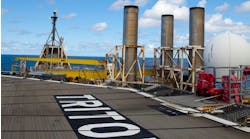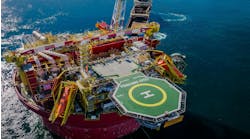Britain’s shale gas debate is serving as a huge distraction in the face of more immediate challenges facing the UK’s energy sector – namely the plight of theNorth Sea oil and gas industry and the lack of progress in building a new generation of nuclear power stations.
All projections suggest the UK will continue to need large quantities of natural gas into the 2020s, even more so if the construction of nuclear power stations is further delayed. The net result could be that the UK will need more natural gas for longer than currently projected.
Energy security is one of the main arguments put forward by the government in favor of shale gas development. But the reality is that even before the recent decision by Lancashire County Council not to approve fracking by Cuadrilla, significant commercial shale gas production onshore in the UK was probably a decade away.
From an energy security perspective, it might be wiser to plan on the basis of a UK “shale fail.” The attention afforded shale gas should instead be directed at maximizing the economic return from the North Sea. The benefits are clear to see: the infrastructure, although aging, is already in place and the industry supports a substantial workforce and generates significant income for the UK economy. Put another way, the clear and present danger is not whether the UK can develop a shale gas industry, it is whether it can arrest the decline in investment in the North Sea and ensure that it maximizes the output of oil and gas from the basin. This is a pressing matter as forces are conspiring to create a perfect storm that could leave large amounts of oil and gas left in the ground.
For those that campaign against oil and gas development, leaving it in the ground is the best solution; but this belies some simple truths about the government’s proposed low carbon energy transition. First, this is not going to happen overnight and the UK’s decarbonization project set a target of an 80% reduction in emissions 35 years from now. Second, in the immediate future the UK is going to continue to need significant amounts of oil and gas. In a relatively short time, the UK has become a significant net importer, with imports accounting for 31.9% of oil and 54.9% of natural gas consumption. If the rate of production decline in the North Sea cannot be arrested then the level of imports will be significantly greater in the 2020s, with all the attendant geopolitical and price security concerns.
One of the things that the current shale gas debate has revealed is just how little the public understands about the UK’s energy system and the challenges that it faces. Citizens are complacent about their 24/7 access to energy services at prices that are lower than much of Europe, no matter how much they complain about the energy companies. More than 80% of households in the UK heat their homes and cook with natural gas, yet they have an inflated view of the current significant of renewable energy in the UK’s energy mix and the role that such intermittent power can play in the near term. Offshore oil and gas production is simply out of sight and out of mind.
For those in the industry and in the halls of Westminster the current plight of the North Sea is well understood; even if some of the problems are the result of an “own goal” by the Treasury in terms of earlier tax increases. The Wood Review provided a precise diagnosis of the challenges and a clear set of recommendations as to what needs to be done. The government accepted all of those recommendations and is in the process of implementing them. The new Oil and Gas Authority has been created and is bedding in, improvements to the fiscal regime have been made, and more are likely. However, the dramatic fall in the oil price has overwhelmed these initiatives as the status of the UKCS as a mature high-cost basin is exposing it to cost-cutting and early decommissioning of infrastructure.
Commenting on the Energy Institute’s recent Energy Barometer Report, Malcolm Brinded, chairman of the Shell Foundation, noted that attracting investment to the North Sea now is critical “…because there is only a short window of opportunity to maximize output from existing producing fields, and to find and develop remaining small prospects, while aging infrastructure is still in place.”
At its recent annual conference in Aberdeen, the new head of Oil and Gas UK, Deirdre Michie, suggested that the industry must find a way to be sustainable in a world of $60 oil. Of course, tax cuts help; but only significant efficiency gains within the industry can make the necessary difference. But the critical point is that both the UK government and the offshore industry need to make the case that an effective regulator, a competitive fiscal regime, and an efficient and technologically dynamic industrial base is now in place in the North Sea making it an attractive place to invest. This is critical to preserving jobs, maintaining production, and ensuring the maximum economic return on the remaining reserves offshore.
Whether or not there is to be a shale gas industry onshore in the UK is far from clear; what is clear is that the government and the offshore industry in the UK need to do more to educate the public as to the critical importance of maximum economic recovery, and they need to demonstrate to international investors that they are doing what is needed to make investment now an attractive prospect. Failure to do so will have far a more significant impact on UK energy security than the recent decisions in Lancashire.
Michael Bradshaw
Professor of Global Energy
Warwick Business School


